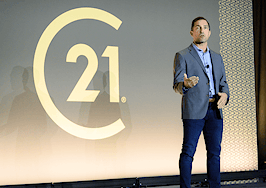Ah, the age-old question: Should I own a brokerage? Every real estate professional comes across this conundrum once or twice in their career. It’s usually followed by calculations totaling up all the commissions you had to split with your brokerage owner, followed quickly by blind rage regarding said commission splits.
I was there. I remember being my brokerage’s top agent and thinking, “I’m keeping the lights on. Shouldn’t I be paid more?” Years later, when I had an opportunity to buy out that broker, I became aware of the countless costs involved in owning my real estate company. I gritted my teeth and signed on the dotted line.
Now, with almost five years of ownership under my belt, an expansion into owning a second real estate shop, and facing the challenges of a changing market where listings don’t fall from the sky and into real estate professionals’ laps, I can effectively look back and share some insight into this process and how I found it to be while hopefully aiding real estate professionals looking to follow in my footsteps.
Recognize your strengths; delegate the rest
Are you good at marketing homes, but terrible at balancing books? Are you excellent on a listing presentation, but can’t articulate your value proposition? Many think because they are top producers with a big team, managing a successful brokerage will come easily. In reality, nothing could be further from the truth.
A brokerage owner must be savvy in multiple areas of business ownership. If they are lacking in one area, they must be able to identify their weaknesses and pay someone to make up for their shortcomings.
While being a good salesperson will certainly aid in your success, being able to properly pivot while recognizing market data trends will be far more helpful.
As a brokerage owner, it’s crucial to be able to identify your own strengths and, more importantly, know when to delegate when you’re not the expert.
Check your ego at the door
I love real estate agents because they are, at their core, entrepreneurs. It’s not easy to leave the corporate positions behind and say, “I will work like a dog for potentially no money whatsoever.” We are risk-takers, self-motivators, and fascinating people to get to know.
Brokers, however, are all that, but with overhead and an innate sense to lead and provide service to their fellow agents. I admit I got into this role by accident, but I would be lying if I said I didn’t love helping one of my advisors negotiate a bidding war or argue on behalf of an ethical issue I know means more to me than the one I’m arguing with.
If you like being the fancy agent arriving in a Bentley and boasting a flourishing Instagram account, perhaps the gritty business of owning your own brokerage isn’t for you. If you are in this business to serve the public, enjoy helping others like you, and somehow, someday, have a level of autonomy and an asset to pass on, then, by all means, buy/open a brokerage.
I spent thousands of dollars building out the space of my first brokerage. The night before our grand opening, the sewer line backed up, and my beautiful brand-new office flooded, ruining opening day and leaving me second-guessing my life decisions. But we built back better, in a new shop location, and now I get to laugh about that incident with my advisors.
If your ego can’t fit through the door you’ve built, it doesn’t deserve a brokerage.
Build for culture, not market share
Yes, of course, market share is important, but as a new brokerage, your culture is the heartbeat of your organization. At our shop, we pride ourselves in creating a culture that encourages collaboration and drives our team to success. Our values are deeply rooted in integrity, respect and excellence, and we look for agents who stand strong in these principles.
Make sure you articulate your values when meeting with potential recruits. Hiring slow and firing fast will be crucial to your success as you build your work environment.
When I was being recruited as a solo agent, everyone touted that their brokerage was a “real family.” I came to realize that many people’s definitions of “family” are abusive and traumatic. Don’t go for the biggest agent or team if they cost you more than they are worth.
With split schedules consistently higher than usual but dropping and some brokerages willing to write checks for part-time agents, recruiting has become one of the broker’s most challenging and frustrating jobs. I joke around that I am horrible at it.
Still, if I’m being honest, my shop runs beautifully with good people who help each other and do enough business that the company is profitable, and they are still paid well and given the services and attention they each need. Are we the biggest brokerage? Not at all. The difference is I don’t want to be.
Decide what sort of brokerage you want to open before you open it, and then stick to that vision as you navigate growth.
Do the right thing
Margins for brokers are thinner than ever. The game is one of distance and perseverance, and the rewards come in creating rockstar agents and having fun in the process.
If you lead with images of Scrooge McDuck diving into gold coins as your mental mantra, you will run your shop into the ground. Lawsuits abound right now, and we as a community must learn from them and look to build a better, more honest, more ethically sustainable industry going forward.
Own a brokerage because you want to be part of that change, not because your split isn’t high enough.
Lead by example and become an inspiring influence for positive change within the industry. Show others what is possible by openly sharing your accomplishments, obstacles, and techniques.
Aside from the obvious financial analysis that needs to, of course, occur, embark on brokerage ownership to move forward and build a better place to work for those rockstars who will follow you into the offices of tomorrow in the hopes that you will change their lives and maybe, just maybe, the industry as a whole. If that sounds appealing, then, by all means, brokerage.
Lisa Troyano-Ascolese is the sole owner, license partner and broker of record for Engel & Völkers Hoboken and Jersey City, as well as the myHOMEboken real estate team leader.













